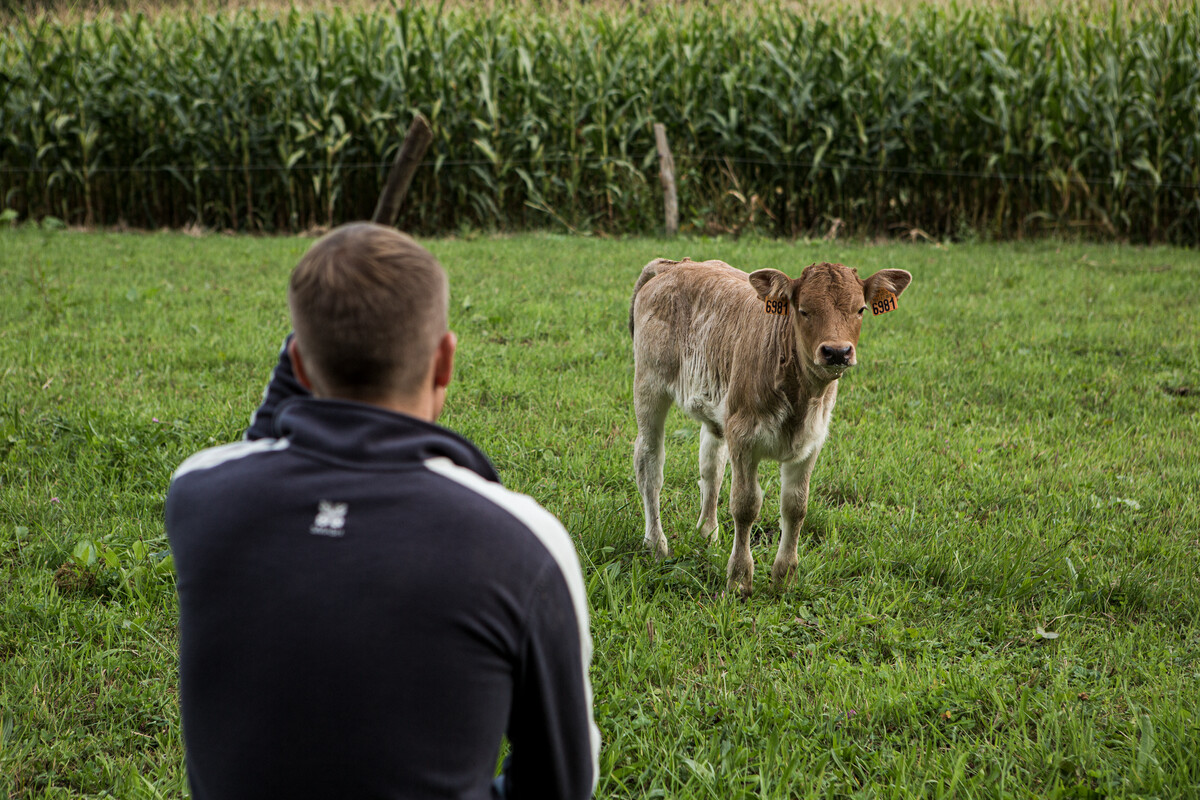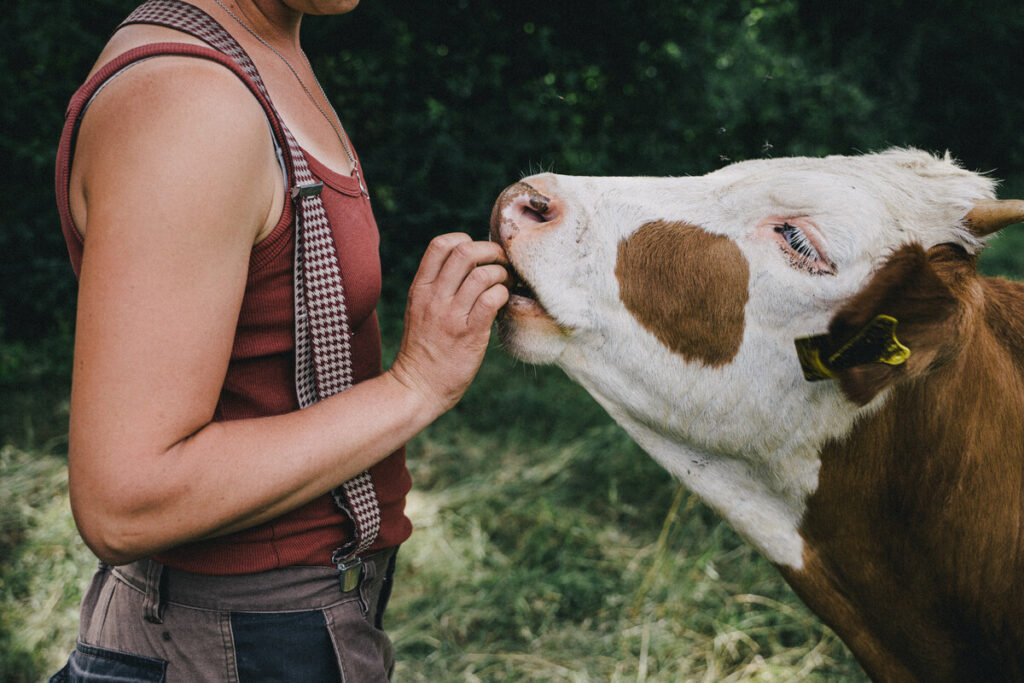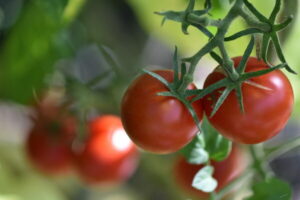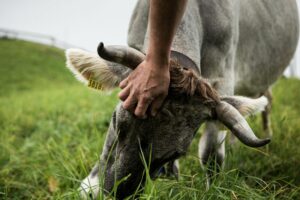Animal welfare: our priority
Essential part of biodynamic farming
Animals, especially cows, play a central role in the farm organism. How come? Cattle in particular are essential, as they provide precious manure for increasing soil fertility. Therefore, the Biodynamic Federation Demeter International is the only organic farming organisation with compulsory animal husbandry on farms in its standards. Only in exceptional cases is it possible to cooperate with a Demeter partner, who then supplies the animal manure. But with this obligation also comes a great responsibility: the welfare of the animals is particularly close to the hearts of Demeter farmers.
Cows with horns
In conventional farming, it is current practice to either dehorn cows or to breed cows without horns mainly to avoid injuries in often limited stable areas. In Germany alone nearly 90% of cows have no horns. Only Demeter standards consistently exclude dehorning and genetic hornless breeding as horns are an integrative part of the animal.
Horns belong to the cow.
They are an organ with a strong blood supply and connected to the respiratory system of the ruminant.[1] Understanding their function can be assisted by the observing the relationship among the cow’s environment, feed and horns: The drier and hotter the climate and the richer the raw fibre and lower the energy content of the feed, the longer the horns of the cows. The wetter and colder the climate and the higher the energy content of the feed, the shorter the horns.
Horns are important for the heat regulation and digestion of the cow, which connects with the forces acting around it via the horns – and it is precisely through this digestion that ruminants provide the most valuable manure and fertility for the farm. Demeter farmers adapt the structure of their stables to avoid any injuries between the cows. Studies show that in spacious housing and with good management focused on the needs of a horned herd, injuries rarely occur.[2]
Animal breeding – organic from the beginning
In biodynamic and organic animal husbandry, the focus lies on the lifetime performance, fitness, health, and nature of the animals. The farmers’ goal is to keep the animals in an animal-friendly way according to their needs. This is in opposition to conventionally bred animals which are often selected for specific high-performance characteristics based on economic criteria.
Demeter farmers strive to commit to independent and organic animal breeding.
Many farmers are already actively breeding and have successfully built up stable herds with long-lived animals. This is intended both to reduce dependence on industrial breeding structures and to breed robust, resilient animals which are adapted to their environment. To enhance animal welfare, the focus lies on multi-purpose breeds as they fulfil more requirements better than specialised high-performance breeds.
While the rapidly increasing breeding for hornless cows avoids the painful dehorning of calves, the long-term impact of horn-lessness on animal performance and health is still uncertain. Therefore, to ensure genetic diversity, it is essential to focus on the breeding of cows with horns.

On-farm slaughter
Over the decades it has become increasingly difficult for farmers to find slaughterhouses close to their farm due to the gradual decline in the number of local abattoirs: a crucial issue for livestock farming. This negatively impacts the farmer’s capacity to avoid long distance transport for animals and hinders the development of direct and local markets. Animals suffer particularly from the long transport times and from poor slaughter conditions. Biodynamic farmers who raised their animals with care suffer particularly from not being able to offer them a low stress end to their lives.
An appropriate solution to this situation is provided by the possibility to practice on-farm slaughter or to use mobile slaughterhouses. Both of these are strongly supported by the Federation as they offer a dignified end-of-life for an animal, and enable farmers to meet consumers’ demand for high welfare, local and regional products and in return receive a fair price for their work.
The Federation sees these as innovative solutions to be further encouraged. If we want to set ambitious targets for animal welfare and develop local and regional markets supporting on-farm slaughter is the way forward. This will require:
- A reinforcement of the current legal basis to allow on-farm slaughter;
- Technical and economic support, especially initially to develop infrastructure;
- A reinforcement of small and local abattoirs, essential for the development of direct marketing.
Read more about on-farm slaughter.
Cows and climate
Cows are often seen as ‘climate killers’. It is true that they produce methane via microbes during the digestion process which has a greater impact on the climate than carbon dioxide emissions. However, if kept and fed in an appropriate way, cows will actually help to protect the climate.
The impact of cattle is particularly negative on the climate when kept in intensive farming systems and when extra fodder is needed to support intensive productivity. High performing cows which produce more than 8,000 litres of milk per year need high-energy-inputs (concentrated feed), just to maintain performance. This means that high yield cows are dependent on fodder from arable land, which could otherwise produce food for humans. As a contrast, for the 5,000-litre cow (relatively low production) grass from permanent pasture is sufficient; on very good pastureland, even more is possible regionally.[3]
Land use changes, such as grassland and forest converted to arable land, are one of the world’s largest contributors to climate change, so the higher yield systems actually reduce the focus on producing human food at the same time as contributing to emissions. Another real focus for agriculture is the use of synthetic nitrogen fertiliser. This releases nitrous oxide, which has 300 times more negative impact on the climate than CO2.
Cattle have the potential to promote root growth through sustainable grazing and thus contribute to humus build-up and associated carbon storage. However, this is only possible if cows go back on pasture. The grazing of cows even preserves habitats for birds, bees and co – a valuable contribution to the protection of biodiversity.
Read more about climate action through agriculture.
Animals play a crucial role in the balance of all ecosystems. They are capable of different patterns of behaviour and even show emotional life in their higher stages of development. Like human beings, they are sensitive to pain. Treating animals in a species-appropriate way is to respectfully deal with life itself.
Helmy Abouleish
President of the Biodynamic Federation Demeter International and CEO of SEKEM, Egypt.
Fodder from the farm
The feed for Demeter animals is produced on the farm or bought in from other biodynamic farms. Animal meal and certain additives are forbidden. Preventive medicines such as antibiotics or hormones are to be avoided as much as possible. This contributes directly to the sustainability of Demeter farms as they do not rely on feed imports and additives for their animals but strive to be as self-sufficient as possible. It also means that Demeter farms are not contributing to the overuse of antibiotics and the development of resistant strains of infection.
Animals bring a specific quality into their environment and their rhythm shapes farm life. They play a key role in biodynamic farming as they provide farmyard manure, build up soil fertility and produce the biodynamic preparations. Therefore, they are a central part of the farm organism. The use of fodder from the farm supports the farm organism to become more self-sufficient.
[1] https://www.fibl.org/fileadmin/documents/shop/1712-cow-horns.pdf
[2] https://www.fibl.org/fileadmin/documents/en/activity-report/ar08-animal.pdf
[3] https://www.metropolis-verlag.de/Die-Kuh-ist-kein-Klimakiller%21/1463/book.do



